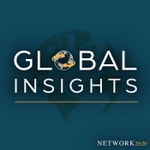Global Insights – Details, episodes & analysis
Podcast details
Technical and general information from the podcast's RSS feed.

Global Insights
Network 20/20
Frequency: 1 episode/10d. Total Eps: 104

Network 20/20’s Global Insights is a series of moderated conversations that brings together a curious global audience to dig deeper into macro-level and region-specific trends shaping our world.
Recent rankings
Latest chart positions across Apple Podcasts and Spotify rankings.
Apple Podcasts
🇬🇧 Great Britain - nonProfit
19/07/2025#100🇬🇧 Great Britain - nonProfit
18/07/2025#84🇬🇧 Great Britain - nonProfit
17/07/2025#70🇬🇧 Great Britain - nonProfit
16/07/2025#62🇬🇧 Great Britain - nonProfit
15/07/2025#45🇬🇧 Great Britain - nonProfit
14/07/2025#29🇺🇸 USA - nonProfit
10/05/2025#98🇩🇪 Germany - nonProfit
06/05/2025#81🇬🇧 Great Britain - nonProfit
26/03/2025#88🇬🇧 Great Britain - nonProfit
25/03/2025#77
Spotify
No recent rankings available
Shared links between episodes and podcasts
Links found in episode descriptions and other podcasts that share them.
See allRSS feed quality and score
Technical evaluation of the podcast's RSS feed quality and structure.
See allScore global : 53%
Publication history
Monthly episode publishing history over the past years.
Talking with the Taliban: Afghanistan Post-Withdrawal
mardi 27 août 2024 • Duration 41:17
August 30th will mark the 3-year anniversary of the final day of the controversial US withdrawal from Afghanistan, an event that marked the end of a nearly twenty-year conflict. The rapid collapse of the Afghan government in the absence of American support and the resulting takeover by the Taliban led to a massive humanitarian crisis and called into question the utility of decades of American occupation. The collapse led to a surge in refugees, a rollback of women’s rights, and a strengthened position for Islamic extremist groups. The region remains unstable, and many American concerns, whether security, economic, or humanitarian in nature, remain in flux. Can the United States negotiate with a group it has viewed as an illegitimate terrorist organization to accomplish these priorities? In what ways can this be most effective? Does engagement with the Taliban set an unwanted precedent for other non-state groups vying for international recognition?
Join us for a conversation with Carter Malkasian, Chair of the Defense Analysis Department at the Naval Postgraduate School, and Masuda Sultan, an Afghan American women’s rights activist and the CEO of Symbio Investment.
The 2024 Olympics: Hidden Agendas and International Politics
mardi 13 août 2024 • Duration 41:40
Visit us at Network2020.org.
The International Olympics Committee (IOC) has consistently positioned itself as against the politicization of sport. In The Olympic Charter, the IOC declares that it has a mission “to oppose any political or commercial abuse of sport and athletes.” However, this has consistently not been the case. Countries like China have used hosting the games to showcase state power. Winning in the Olympics is a way to increase international prestige. Individual athletes have used the games as a platform for protests. There have been diplomatic boycotts of adversarial countries. So, how do international politics play into sporting events like the Olympics? How can sports be a tool for cultural relations? How do the 2024 Olympic games reflect current geopolitical trends? Join us for a conversation with Dr. Sarah Hillyer, Founder & Director of the Center for Sport, Peace & Society at the University of Tennessee, and Dr. Susan Brownell, Curators’ Distinguished Professor of Anthropology at the University of Missouri-St. Louis.
Music by Musictown from Pixabay
Music by Aleksey Chistilin from Pixabay
Ukraine, Wagner, and Navalny: Putin’s Perpetual Power and What It Means for Russia
mardi 2 avril 2024 • Duration 43:02
The 2024 Presidential Election in Russia, scheduled from March 15 to 17, 2024, comes amid heightened tensions following the tragic death of Alexei Navalny, Putin’s former opposition leader. Navalny’s death has underscored the serious threat to political opposition and civil liberties in Russia. With most opposition figures either in jail or in exile abroad, President Vladimir Putin, now 71 years old, has secured another term, extending his rule until at least 2030. The election further consolidates Putin’s domestic and international policies, including Russia’s war in Ukraine, but hat will the next Putin term look like, and how might it shape Russia’s domestic policies? What can the United States and the international community expect from a further emboldened Russian leader?
Music by soundbay from Pixabay
Struggling Democracy: Politics, Power, and Elections in Pakistan
mardi 19 mars 2024 • Duration 44:22
The recent events around Pakistan's general elections have highlighted significant challenges to the country's democracy. The legal issues and opposition faced by former Prime Minister Imran Khan and his party point to a worrying trend of diminishing democracy at a time of economic crisis.
Amidst this tension, Pakistan's democratic institutions face a critical test. But what does this mean for the country's future? What role does the military's influence play in Pakistan's political landscape, and how does that affect the democratic process?
Music by alper omer esin and Sergii Pavkin from Pixabay
Is the U.S. Ready to Support Multiple Conflicts?
mardi 12 mars 2024 • Duration 55:42
As the global geopolitical landscape evolves, the United States finds itself at a crossroads, facing the reality of either supporting or negotiating multiple and simultaneous conflicts. Today, ongoing wars in Ukraine and Gaza and actions by countries like China, Russia, Iran, and North Korea are destabilizing the post-WWII world order and Washington’s strategic preparedness. President Biden’s assertion that the United States can simultaneously support the current conflicts raises essential questions about the United States’ capacity to engage in additional crises, particularly with potential flashpoints involving China in Taiwan or the South China Sea.
Join us for a comprehensive discussion on America’s strategic readiness. Our panel includes Dr. Raphael “Rafi” Cohen, Director of the Strategy and Doctrine Program of RAND Project AIR FORCE, Dr. Jennifer Kavanagh, Senior Fellow in the American Statecraft Program at the Carnegie Endowment for International Peace and Political Scientists at the RAND Corporation; and Professor Simon Reich, Professor of the Division of Global Affairs, Political Science at the Rutgers School of Arts & Sciences – Newark.
Music by SPmusic, Sergii Pavkin, and Yurii Semchyshyn from Pixabay
Defending Ukraine’s Democracy: Reconstruction and the Private Sector
mardi 5 mars 2024 • Duration 48:04
As the conflict enters its third year, Ukraine faces a daunting task of rebuilding its infrastructure, economy, and society, all while fighting a costly war. The need for international support is clear, but with the US presidential election looming, uncertainty clouds the future of aid. Can private sector involvement fill the gap? And what impact will Ukraine's reconstruction play in the larger picture of defending democracy? Join us in a discussion with Michael Newson, Senior Program Coordinator for Migration and Sustainable Development at the International Organization for Migration in Kyiv; Tetyana Korotka, Deputy Business Ombudsman of the Business Ombudsman Council; and Eric Hontz, Director of the Center for International Private Enterprise’s Center for Accountable Investment.
Music by Aleksey Chistilin and alper omer esin from Pixabay
Unfrozen: Global Competition in the Arctic
jeudi 29 février 2024 • Duration 43:31
The Arctic has become an increasingly active geopolitical battleground for the United States, Russia, and China. Thawing ice caused by climate change opens the possibility of the region becoming a global shipping lane, potentially transforming international trade. China, although not an Arctic nation, has stepped up efforts to expand its presence in the area, creating new opportunities to enforce its interests abroad. The Arctic Council, previously a positive and active body for the region, has not met since Russia’s second invasion of Ukraine, reducing international dialogue over the region. Meanwhile, the United States is in the process of increasing its local military deterrent. What are the interests of China, Russia, and the US in the area and how is each working to achieve them? How will climate change affect how nations act towards the Arctic? What will NATO expansion mean for the security of the region?
Join us for a discussion with Evan Bloom, Senior Fellow at the Polar Institute at the Wilson Center, Dr. Marc Lanteigne, Associate Professor of Political Science at the Arctic University of Norway, and Pavel Devyatkin, Senior Associate at the Arctic Institute.
Music by Sergii Pavkin and Mike Cole from Pixabay
The Roots of Pakistan's Triple Crisis (Revisited)
mardi 20 février 2024 • Duration 35:59
A political upheaval has left Pakistan reeling, with the party of Imran Khan, who is in jail, making unexpected gains and challenging long-standing party dominance. And all of this amidst economic collapse, international debt, inflation, and the aftermath of devastating floods. Today on Global Insights, we’re revisiting a crucial conversation from last year with Mr. Shuja Nawaz, the first director of the South Asia Center at the Atlantic Council, diving deep into Pakistan’s ongoing triple crisis. As Pakistan faces economic turmoil, political paralysis, and escalating security threats, how will these challenges shape its democratic future?
Music by Sergii Pavkin, Musictown, and Yrii Semchyshyn from Pixabay.
NYC’s Migration Crisis: Drivers, Challenges, and Solutions
mardi 13 février 2024 • Duration 47:00
This second part of our Migration Mini-Series. Since spring 2022, more than 130,000 migrants have arrived in New York City, a city that is known for welcoming and integrating generations of immigrants. Yet, the strain on local government resources and shelters had led Mayor Eric Adams to call the situation a humanitarian crisis and even declare a state of emergency, claiming that the federal and state governments are not doing enough to help the city with this challenge. With the mayor stating that the city has reached capacity and meeting with leaders of other countries to discourage further migration to New York City, what does this current migration influx mean for “The City of Dreams”? How can New York, and the United States, remain a beacon of hope for those looking for opportunity in a new country while remaining fiscally prudent? Join us for a conversation with Ms. Camille Joseph Varlack, Chief of Staff to Mayor Eric Adams of New York City; Mr. Muzaffar Chishti, Senior Fellow at Migration Policy Institute (MPI) and Director of MPI’s office at New York University School of Law; and Professor Nancy Foner, Distinguished Professor of Sociology at Hunter College and the Graduate Center, City University of New York.
Music by Alexey Ivanov and Oleksandr Stepanov from Pixabay
Innovation Edge: The U.S., China, and the New Geopolitical Landscape
mardi 6 février 2024 • Duration 46:57
In recent years, China’s tech and innovation sector has emerged as a disruptive force on the world stage, growing to rival, and in some areas, surpass that of traditional technology leaders like the United States. Companies like Alibaba, Tencent, and Huawei have achieved global recognition, not only for their size but also for their innovations in e-commerce, digital payments, 5G technology, and artificial intelligence. Alongside China’s expansive Belt and Road Initiative, how will their tech and innovation travel across the globe? Is China on track to surpass the U.S. in technology, and what does this mean for the world? What do we often get wrong about China’s tech industry, and how do those misconceptions shape global relations? What is the best way for the U.S. to react to China’s tech surge while fostering global cooperation?
Join us today for a discussion that explores the rise of China’s tech and innovation sector and the potential repercussions for the U.S.-China relationship. Our speakers for this discussion are Robert D. Atkinson, founder and president of the Information Technology and Innovation Foundation (ITIF), Dr. Tai Ming Cheung, director of the University of California Institute on Global Conflict and Cooperation, and Rebecca Fannin, founder of Silicon Dragon Ventures.
Music by Oleksandr Stepanov from Pixabay









